Feb. 15, 2024
Publications

🌐follow Marie-Anne Frison-Roche on LinkedIn
🌐subscribe to the Newsletter MAFR Regulation, Compliance, Law
____
► Full Reference: M.-A. Frison-Roche, "Adjusting General Procedural Law to Compliance Law by the Nature of things", in M.-A. Frison-Roche (ed.), Compliance Jurisdictionalisation, Journal of Regulation & Compliance (JoRC) and Bruylant, "Compliance & Regulation" Serie, 2024, pp. 273-28.
____
📝read the article
____
🚧read the bilingual Working Paper which is the basis of this article, with additional developments, technical references and hyperlinks
____
📘read a general presentation of the book, Compliance Jurisdictionalisation, in which this article is published
____
The principal elements of this articles had been presented during the scientific manifestation held on September 23, 2021, at Dauphine University in Paris, coorganised by the Journal of Regulation & Compliance (JoRC) and the Institute Droit Dauphine.
In the book this article is placed in the chapter II about the General Procedural Law in the Compliance Law.
____
► Summary of the article (done by the Journal of regulation & Compliance - JoRC): General Procedural Law is an invention, essentially due to Professor Motulsky, going well beyond the gain that one always has in comparing types of procedures with each other. As he asserted, there is Natural Law in General Procedural Law, in that as soon as there is the Rule of Law Principle there cannot be, whatever the "procedure", even the "process", such and such way of doing things: for example, to decide, to seize the one who decides, to listen before deciding, to contest the one who has decided.
General Procedural Law therefore depends on the nature of things. However, Compliance Law organizes things in a new way. Therefore, both the simple and iron principles of General Procedural Law creep in where we do not expect them at first sight, because there is no judge, this character around whom ordinary procedures fit together. The principles of General Procedural Law are essential in companies. Even if the regulations do not breathe a word about it, it is up to the Judges, in particular the Supreme Courts, to recognize this nature of things because on this effect of nature that General Procedural Law is built: when compliance mechanisms oblige companies to strike, General Procedural law must oblige, even in the silence of the texts, to arm those who can be hit, even stand up against devices that would set aside too much these defenses that are easily considered contrary to efficiency (I).
But because it is a question of making room for this nature of the things of which the Rule of Law Principle entrusts the custody to the Judge and the Lawyer, the General Procedural Law must also adjust itself to what the extraordinary new branch of Law Compliance Law is. Indeed, Compliance Law is extraordinary in that it expresses the political pretention to act now so that the future will not be catastrophic, by detecting and preventing the realization of systemic risks, or even that it is better, by building effective equality or real concern for others. Because it is the Monumental Goals that defines this new branch of Law, a disputed systemic issue, possibly disputed by several parties before a judge, the procedural principles used by the court must be broadened considerably: they must then include civil society and the future (II).
General Procedural Law thus naturally acquires an even more place than in the classic branches of Law since on the one hand it imposes itself outside of trials, particularly in companies and on the other before the courts it involves people who had hardly any place to speak and thinks themselves, especially the systems entering the "causes" of Compliance now debated before the Judge.
________
June 14, 2023
Conferences
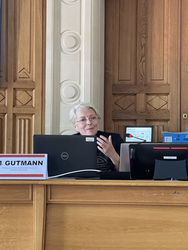
♾️follow Marie-Anne Frison-Roche on LinkedIn
♾️subscribe to the Newsletter MAFR Regulation, Compliance, Law
____
► Full Reference: M.-A. Frison-Roche, "Compliance et droit processuel" ("Compliance and Procedural Law"), in B. Deffains, M.-A. Frison-Roche and J.-B. Racine (dir.), Journal of Regulation & Compliance (JoRC) and University Panthéon-Assas (Paris II), Compliance : Obligation, devoir, pouvoir, culture (Compliance : obligation, duty, power, culture), University Panthéon-Assas, Salle des Conseils, 14 June 2023.
____
🧮See the full programme of this event
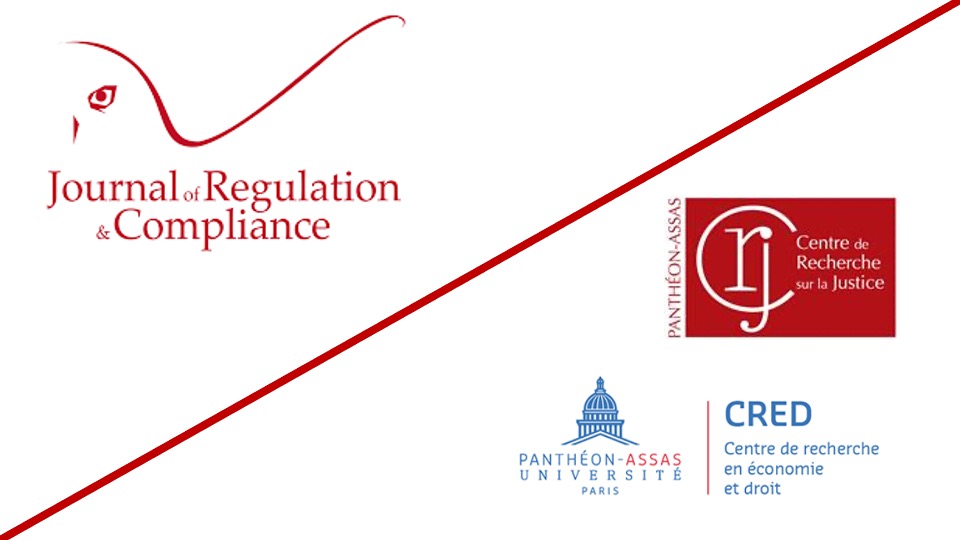
____
🎤see the other speech made during the first day of this symposium : "L'obligation de compliance, entre volonté et consentement : obligation sur obligation vaut" ("Compliance Obligation, between will and consent: obligation on obligation works")
____
► Summary of the conference: After referring to the chapter in the book Compliance Jurisdictionalisation, which deals more specifically with Procedural Law
The first development relates to the fact that the relationship between Compliance Law and Procedural Law is very difficult because it is often said that they simply have nothing to do with each other, or that they have everything to dislike each other. This is because Compliance is often reduced to processes, and to the mechanical place that algorithms could take in it, in taking care of everything.
Compliance would even have the purpose and effect of ensuring that the company and its managers never come into contact with a judge, the public prosecutor being their best ally in this respect.
Secondly, I recalled the very common idea that Procedural Law is a kind of 'tribute' that the rule of Law demands, which certainly weighs down companies when compared with companies living in systems in which there's not not such a price.
But many stress that Procedural Law could become a model. This can be justified and technically anticipated because it has already happened in Regulation Law, and Compliance Law is the deployment of it
In the third stage, I worked on the alliance between the two, with the procedure (rather than the process) modifying compliance and thereby reinforcing it, evoking the way in which this can manifest itself technically
In the fourth step, I looked for what would be the "naturally appropriate procedure" for Compliance: one that takes into account the duration and the development of "solutions", to which the notion of "sustainability", which is central in the substantive Law of Compliance, refers.
In a fifth stage, and devoting more time to this, I have pointed out where innovation should be the strongest: the proof, the probatory obligation being the "part totale" ("total part") of the compliance obligation. This major issue will be the subject of a series of symposiums held in 2024.
________
See the articles that are part of the Second chapter of the book 🕴️M.-A. Frison-Roche (ed.), 📘Compliance jurisdictionalisation, 2023 :
- 🕴️N. Cayrol, 📝General Procedural Law in Compliance Law,
- 🕴️F. Ancel, 📝The procedural principle of compliance, a new trial leading principle?,
- 🕴️B. Sillaman, 📝Privilege and Cooperation: Procedural Lessons Learned from the U.S. for Global Application,
- 🕴️A. Linden, 📝Motivation and publicity of the decisions of the restricted committee of the French Personal Data Protection Commission (Commission nationale de l'informatique et des libertés-CNIL) in a compliance perspective,
- 🕴️S. Scemla and 🕴️D. Paillot, 📝The supervisory Authorities face difficulties to apprehend the Rights of the Defense,
- 🕴️M.-A. Frison-Roche, 📝Adjusting by the nature of things General Procedural Law to Compliance Law.
🕴️M.-A. Frison-Roche, 🚧From Regulation Law to Compliance Law, 2017.
🕴️M.-A. Frison-Roche, 🎤Le rôle du Juge dans le déploiement du Droit de la Régulation en Droit de la Compliance (The role of the Judge in the deployment of Regulatory Law in Compliance Law), in 🧮De la Régulation à la Compliance : quel rôle pour le Juge ?, 2023.
Notably in this perspective, 🕴️M.-A. Frison-Roche and 🕴️M. Boissavy, 📕Compliance et droits de la défense. Enquête interne - CJIP - CRPC (Compliance and Due Process. Internal Investigation - DPA), 2024.
Feb. 16, 2023
Thesaurus : Doctrine
► Référence complète : J. Habermas, Espace public et démocratie délibérative : un tournant, Gallimard, 2023, 144 p.
____
Lire la présentation de l'ouvrage par Jean-Pierre Gabrielli pour Non-Fiction.
Lire la présentation de Marc Lebiez pour EAN
____
📧Lire l'article écrit à partir de cet ouvrage dans la Newsletter MAFR Law, Compliance, Regulation ; 🔴𝑳'𝒆𝒔𝒑𝒂𝒄𝒆 𝒑𝒖𝒃𝒍𝒊𝒄 𝒅é𝒍𝒊𝒃é𝒓𝒂𝒕𝒊𝒇, 𝒎é𝒕𝒉𝒐𝒅𝒆 𝒎𝒐𝒅è𝒍𝒆 𝒑𝒐𝒖𝒓 𝒍𝒂 𝒎𝒊𝒔𝒆 𝒆𝒏 œ𝒖𝒗𝒓𝒆 𝒅𝒖 𝒅𝒆𝒗𝒐𝒊𝒓 𝒅𝒆 𝒗𝒊𝒈𝒊𝒍𝒂𝒏𝒄𝒆, 6 avril 2023.
________
May 9, 2022
Publications

► Référence complète : Frison-Roche, M.-A., Notes prises pour la synthèse sur le vif de la conférence L'office du juge et les causes systémiques, in Cycle de conférences, Penser l'office du juge, Grand Chambre de la Cour de cassation, 9 mai 2022, 17h-19h.
____
► Résumé des notes prises au fur et à mesure de la conférence : les trois juges, Christophe Soulard, Président de la Chambre criminelle de la Cour de cassation, Fabien Raynaud, Conseiller d'Etat, et François Ancel, Président de la Chambre internationale de la Cour d'appel de Paris, invités à réfléchir et réagir à une hypothèse, à savoir l'existence parmi les cas qui leur sont apportés par les parties, sont intervenus à la fois d'une façon très diverse, très originale et exprimant pourtant l'unicité de l'art de juger.
Les notes prises ci-dessous montrent que les juges ont conscience que les temps ont changé et que, de plus en plus, les "systèmes" sont présents dans les causes qui, construites par les parties, leur sont présentées (1). Leurs analyses, réactions et propositions ont montré à ceux qui les écoutaient que pour appréhender des causes systémiques, les juges doivent être expérimentés (2). Ils ont eu souci de fixer des critères pour identifier la nature systémique des causes parmi la multitude de celles qu'ils traitent, justifiant alors un traitement procédural et décisionnaire particulier (3). L'auditoire a ainsi pu mesurer la part qui revient aux parties (4), puisque le système est dans la construction des faits de la cause et la part qui revient à l'office du juge (5).
Il apparaît alors que par un effet de miroir, l'office du juge se déplace de l'Ex Post vers l'Ex Ante (6), les trois juges décrivant et proposant des mécanismes concrets pour appréhender en Ex Ante cette dimension systémique et y répondre (7). Ils soulignent que cela s'opère en collaboration avec les avocats, dans une instruction élargie et le débat contradictoire (8), dans une collaboration qui s'opère en amont (9). Les trois magistrats ont recherché les techniques procédurales pour accroître la plus grande considération des systèmes (10) et les nouvelles organisations à mettre en place pour répondre à cette dimension systémique de certaines causes (11). Pour ce faire, une dialectique est à opérer vers, à la fois, de l'informel mais aussi plus de formel (12), l'ensemble produisant une meilleure réception méthodologique des systèmes par les juges (13) par une plus grande compréhension entre les juges, quel que soit leur niveau et les droits substantiels en cause, les autorités et les parties systémiques (14).
____
🎥Voir la vidéo de l'ensemble de la conférence
🎥 Voir la vidéo de la synthèse réalisée sur le vif par Marie-Anne Frison-Roche au terme de la conférence
____
📝Lire l'article de Marie-Anne Frison-Roche rendant compte au Dalloz de la conférence.
____
🚧 lire le document de travail L'hypothèse de la "cause systémique, réalisé préalablement à la conférence, pour préparer celle-ci.
_____
✏️ lire les notes exhaustives prises pendant la conférence⤵️
Sept. 23, 2021
Thesaurus : Doctrine

► Full Reference: S. Scemla & D. Paillot, "The difficulty for Compliance Enforcement Authorities to comprehend the Rights of the Defence in compliance matters", in M.-A. Frison-Roche (ed.), Compliance Jurisdictionalisation, Journal of Regulation & Compliance (JoRC) and Bruylant, coll. "Compliance & Regulation", to be published.
____
📘read a general presentation of the book, Compliance Jurisdictionalisation, in which this article is published
____
► Summary of the article (done by the Authors): Since 2016, French companies subject to the provisions of the so-called “Sapin 2” Law must implement eight stringent anti-corruption measures, such as a risk mapping, a whistleblowing procedure or a third-party due diligence procedure.
To ensure their compliance with these obligations, the Sapin 2 law created the Agence française anticorruption - AFA (French Anti-Corruption Agency), which had been assigned three missions: firstly, to help any person prevent and detect corruption; secondly, to control the quality and effectiveness of the anti-corruption programs deployed by the companies; and thirdly, to sanction any breaches, through its Sanctions Committee.
As pointed out by the French Conseil d’Etat, the powers devolved to the administrations have multiplied and became stratified. While the Conseil d'Etat suggests to improve both the conduct and the effectiveness of administrative controls by harmonising their practices and simplifying their prerogatives, it is urgent to remedy the numerous procedural failures that undermine the rights of defence.
In fact, the AFA exercises various powers when undertaking its controls. Some of these powers are not provided for by the Law, and most of them infringe fundamental rights and freedoms among which the adversarial principle and the freedom not to self-incriminate. For instance, the AFA does not necessarily draft minutes of the interviews it conducts, thus depriving the interviewee of the possibility to challenge the statements reported by the AFA to the Sanctions Committee.
From a more structural point of view, the scope of the AFA's mission is extremely broad. The Law allows the AFA to request the communication of "any professional document or any useful information", without defining the notion of usefulness. Also, the AFA considers that the entity cannot benefit from the legal privilege that would cover their documents, and considers that an entity who voluntarily hands over a document, without expressing any reserves, waives its right to the benefit of its legal privilege.
Apart from the severe consequences that could arise if another proceedings was to be initiated by a foreign authority, the concept of "voluntary handover" does not faithfully reflect the reality. Indeed, the controlled entities only cooperate under the threat of being prosecuted on the basis of an obstruction to the control, which compels them to communicate documents even when facing the risk of contributing to their own incrimination.
These many procedural deficiencies encountered during AFA controls must therefore be reformed, as recommended by the Conseil d’Etat, so as to require the authorities to take into account the rights of the defence.
____
🦉This article is available in full text to those registered for Professor Marie-Anne Frison-Roche's courses
__________
Updated: Jan. 14, 2021 (Initial publication: Dec. 14, 2020)
Conferences
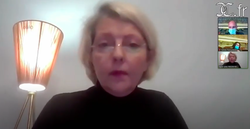
► Full Reference : Frison-Roche, M.-A., The Economic Attractiveness of Impartiality ("L'attractivité économique de l'impartialité"), in ""Economic Attractiveness, Judge Office and Impartiality. Thinking the judge Office" ("L'attractivité économique, l'office du juge et l'impartialité. Penser l'office du juge"),
____
🎥 watch the conference (in French with English subtitles)
____
📝 read the colloquium program ( in French)
📝 see the general program of the cycle on the Judge Office.
____
📝 read François Ancel's article of 14th of January 2021 in the Receuil Dalloz and which report this colloquium (in French)
📝 read the Working Paper, basis of this conference.
This Working Paper is significantly different from the conference because it was conceived befor the colloquia cycle beginning. In addition, since this manifestation was a Round Table, the conference has taken more into account previous conferences and what said the other two speakers.
📊 see the slides, basis of the conference (in French)
The slides could not be shown during the conference. Orally, it was appropriate to more develop the introductory remarks for emphasizing the human and unique dimension of the Judge Office, expected in economic matters. As a result, the second part of the conference was not given orally, so slides therefore remain the only media available.
____
► Summary of the conference : To fit into the ambition of this general colloquia cycle, which is to "Think the Judge Office" and in this round table which apprehends the imperative of economic attractiveness of this office, firstly emerges the seemingly contradictory relationship between this imperative and the distance that the judge must maintain. Thus it is often asserted that the judge should be internalized at this point in the "places", - an economic concept of great scope (to which the first part of the introduction is devoted, defining the "place" at the same time as a closed and porous space and as a "systemic litigant" -, that he/she should ipso facto lose his/her distance, that is to say his/her impartiality. As places are in competition, even if weighing on one hand the effectiveness of the place, and on the other hand the impartiality of a judge who is external to this place - Judge referring to the Law , Impartiality would necessarily emerge weakened. It would then be necessary on a case-by-case basis to get the judge to give the desired concessions...
The conference aim is to take the opposite position and to state that the Place - in particular because they must be strongly distinguished from the Markets, of which they were the ancestors - require a Judge, who is at the same time "singular", that is to say with a personality, a face, opinions, and in distance so that his/her imagination does not surprise Place. Indeed, these require a human Justice, and a not mechanical one and singular judges, of whom the juge des référés or the arbitrator are the epigone, meets this need. But for reducing their "margins of discretion", how Economy qualifies the Impartiality of a person who can never be neutral, the singular Judge's Office must be inserted into mechanisms reducing these margins. In this way, the Place may reach a Judge who is always more impartial, and in doing so the Place becomes always more attractive.
To achieve this in practice, the place expresses two legitimate expectations, as a "systemic litigant", whose satisfaction increases and the singular Judge's Impartiality and increases the Attractiveness of the Place as a space. This clearly shows that the Place's Attractiveness and the Judge's Impartiality, because judges are inserted into procedures, into institutions and into a "jurisdictional family", are not only not contradictory, but are on the contrary convergent, one fueling the other.
Concretely, and judicial practice shows it, it is necessary to consolidate the particular Judge's Impartiality by inserting him/her into collective processes. As it is necessary to promote a radiance of Impartiality by strengthening the "jurisdictional family".
To consolidate the singular Judge's Impartiality by inserting him/her into collective processes, it is necessary to admit without hesitation the subjectivity of the judge, to seek it even. The reduction of the margins of discretion, definition of impartiality, being obtained by the inclusion of the judge in a procedure of which he /her alone is the master but in which he/her is not alone. This has the technical consequence that he/her is himself/herself in an adversarial debate, not only during the proceedings, but also before (in the media), inside the judgment (and the decision of the Criminal Chamber of 25 November 2020 is a model of that) and after the judgment. By that, the Judge shows that by his/her office he/she is in the future, as climate justice will show. In addition, to limit his/her margins of discretion, the singular judge must fit into a rational principle of coherence, vertical and horizontal. Vertical coherence, because he/she integrates what it is said and the technique of the "determining opinion" is to be encouraged, the singular judge having to avoid it only if he/she has "strong reasons" to do it. This is to follow this general rule Comply or Explain (which is the very opposite of blind obedience). Horizontal coherence, because the singular judge either sticks to what he/she said, estoppel also being a rule of logic. But above all, the institution must extract as much as possible from " institutional doctrines", by all means, of which the annual reports are an example.
To consolidate the singular Judge's Impartiality by strengthening the notion and reality of the "Jurisdictional Family", it is necessary to have of it a broader conception, which could lead to "guidelines" common to various jurisdictions, and a stronger one, by integrating those surrounding the judge to lead to judgment. In this, the procedure before the Court of Justice of the European Union, working on a common file, is a model. If this community were even stronger, the Judge Office would be even more useful than it is already in the digital space.
Thus, Judges who are always human, always diverse, always singular, who listen, consider and adjust to the situation, who within a Jurisdictional Family fit into an Institutional Doctrine which transcends and supports them but which they transform if there is a strong reason to do so, a reason always expressed said: this is the embodied Impartiality that makes an economic and financial Place attractive.
________

Jan. 17, 2020
Publications
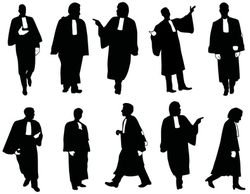
This Working Paper written in English is the basis for an article published in French in the French journal Dalloz Avocat , in March 2020.
Summary of the working Paper.
If we perceive Compliance Law as an aggression of the private company and a binding set of mechanisms that have no meaning and added value for it, then the attorney has a utility: defending the business. It can do so not only during the sanctions phase, but also to prevent it.
But this function is not central.
It becomes so if we understand Compliance Law as a body of substantial rules, pursuing a "monumental goal": the protection of the person, goal injected by political bodies and taken up by the operator. From this, the company must convince everyone to take it back, inside the company and outside. In a general and contradictory debate, the attorney carries this conviction, because he and she is always convincing those who at the end judge (market, public opinion, etc.) that is their raison d'être.
(In this short document, the pop-ups refer to the different works that develop each of the points)
Feb. 14, 2019
Thesaurus
Référence complète : Supiot, A., Kafka, un artiste de la Loi, in dossier Kafka, Le nouveau magazine littéraire, n°14, février 2019, pp.92-95.
May 22, 2018
Thesaurus : Doctrine
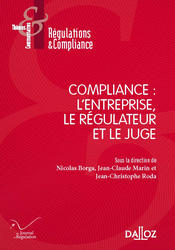
Référence complète : Schiller, S., La compliance extra-financière les risques de contradictions de domaines d'application, in Borga, N., Marin, J.-Cl. et Roda, J.-Cl. (dir.), Compliance : l'entreprise, le régulateur et le juge, Série Régulations & Compliance, Dalloz, 2018, pp. 55-66.
Lire une présentation générale de l'ouvrage dans lequel est publié l'article.
Consulter les autres titres de la Série dans laquelle est publié l'ouvrage.
Oct. 4, 2017
Thesaurus : Doctrine
► Référence complète : J.-M. Darrois, "La loi Sapin 2 : un défi pour les avocats", in M.-A. Frison-Roche (dir.), Régulation, Supervision, Compliance, Dalloz, Série Régulations, 2017, p.91-94.
____
📕Lire la présentation générale de l'ouvrage dans lequel l'article est publié.
____
📚Consulter les autres ouvrages de la Série dans laquelle l'ouvrage est publié.
____
Les étudiants suivant le cours de Marie-Anne Frison-Roche peuvent lire l'article en texte intégral.
________
Feb. 22, 2017
Thesaurus : Doctrine
Dec. 1, 2014
Publications
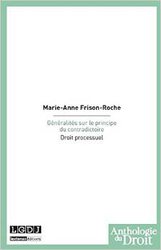
Full reference: Frison-Roche, M.A., Généralités sur le principe du contradictoire. Étude de droit processuel, coll. "Anthologie du Droit", LGDJ - Lextenso éditions, 2014, 221 p.
____
Republished from Généralités sur le principe du contradictoire », Étude de droit processuel, Th. Paris II, 1988.
This book is the publication of a thèse d'Etat (French official thesis) written under the direction of Jean Foyer and defended in the Panthéon-Assas University (Paris II) face to a jury made up among others of François Terré, René Chapus, Gérard Cornu, Geneviève Viney.
The main idea is to defend that the principle of contradictory is a simple and fundamental principle, without which there is no Law. It is the reason it is obvious to study it as in civil procedure as in criminal, administrative or arbitrary procedures, to take back a "Procedural Law" perspective conceived by Motulsky. Indeed, without a judge listening without having already decided the facts and Law versions that presents who's the situation will be affected by the decision that the judge will make, there is no rule of Law.
The main beneficiary of the principle of contradictory, it is not really the person, and it is in this that the contradictory is detached from the rights of the defense, it is the judge. Indeed, emphasizing contradictory versions of Law and facts which collide in front of him or her, the judge perceives more exactly and more fairly the world and the use of Law that he or she should favor. Thus, Law is better used. In this, we can consider that the principle of contradictory is consubstantial to Law.
Updated: July 31, 2013 (Initial publication: Oct. 17, 2011)
Teachings : Les Grandes Questions du Droit, semestre d'automne 2011

Oct. 29, 2012
Publications
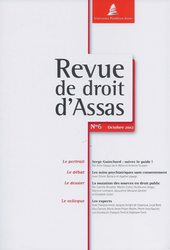
► Référence complète : Frison-Roche, M.-A., Experts et procédure : l'amicus curiae, Revue de droit d'Assas, octobre 2012, p.91-94.
____
____
Lire le résumé de la contribution ci-dessous⤵️
Updated: April 18, 2006 (Initial publication: )
Thesaurus : Doctrine
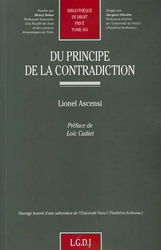
► Référence complète : L. Ascensi, Du principe de la contradiction, préf. L. Cadiet, LGDJ, coll. "Bibliothèque de droit privé", t. 454, 2006, 536 p.
____
► Résumé de l'ouvrage (fait par l'auteur) : "L'examen du droit positif révèle l'extension du champ d'application de la contradiction. Les procédures juridictionnelles ne sont en effet plus les seules concernées par l'application du contradictoire mais, de façon plus générale, la contradiction tend à s'appliquer dans l'ensemble des procédures de résolution des litiges. Cette expansion ne s'est toutefois pas réalisée au prix du dévoiement du concept de contradiction, mais elle s'est au contraire accompagnée de la stabilité structurelle de la notion. Ceci invite alors à ériger le contradictoire en une catégorie juridique unique en dépit de sa très large application, à remettre en cause sa qualification de principe directeur du procès et à lui substituer une qualification bien comprise de droit fondamental. La diffusion de la contradiction dans l'ensemble du droit est favorisée par le fait que les fonctions du contradictoire dans le procès sont aussi ses vertus hors celui-ci. Sur l'ensemble de son domaine d'application, la contradiction exerce en effet une fonction de protection des intéressés et une fonction heuristique, puisqu'il peut être démontré, en théorie comme en droit positif, que le contradictoire est le support juridique de l'élaboration dialogique de la décision. La contradiction constitue donc un droit fondamental, non seulement parce qu'elle vient protéger la liberté de l'homme qui est au fondement de l'Etat de droit, mais aussi parce que la discussion contradictoire est essentiellement au cœur des procédures de résolution des litiges, dont elle légitime la décision qui en exprime l'issue. L'unité conceptuelle de la contradiction n'empêche cependant pas qu'elle soit mise en œuvre de manière différenciée selon les situations. Les fonctions du contradictoire sont en effet concurrencées par des exigences de nature à limiter, voire à exclure son application. De même, l'étude des règles de mise en œuvre de la contradiction dévoile leur adaptation aux spécificités de chaque litige et leur capacité à faire prévaloir le contradictoire dans de multiples hypothèses juridiques. La contradiction est ainsi autant caractérisée par sa relativité que par sa prévalence et sa capacité à mettre les structures de l'ordre juridique au service de sa réalisation.".
________
Aug. 4, 2004
Publications
Référence complète : FRISON-ROCHE, Marie-Anne, Le principe du contradictoire et les droits de la défense devant l’Organe de Règlement des Différents de l’Organisation Mondiale du Commerce in Le principe du contradictoire devant les juridictions internationales, collection « Contentieux international », Pedone, 2004, pp.125-148.
Oct. 1, 2001
Publications
► Référence complète : Frison-Roche, M.-A., L’erreur du juge, RTD civ., 2001, pp.819-832.
____
►Résumé de l'article : Le principe est que le juge ne commet pas d'erreur, ou plutôt qu'on ne peut, en droit, se prévaloir des erreurs commises par les magistrats, hors voies de recours légalement organisés. Cela préserve à la fois la paix sociale et l'indépendance de la magistrature. Mais ces raisons ne sont pas de marbre car les erreurs judiciaires peuvent ébranler les sociétés, il suffit d'évoquer l'affaire Dreyfus, et le lien entre le procès et la vérité se satisfait mal de la règle. Il faut donc pouvoir rouvrir pour mieux refermer la blessure, admettre le désordre pour garantir la sécurité juridique et la confiance dans le système juridictionnel.
Le principe de référence demeure pourtant celui de l'incontestabilité de l'erreur du juge. En effet, l'appréciation substantielle d'une appréhension inexacte des faits par le juge est exclue par le mécanisme de la "vérité judiciaire", qui, par le pouvoir d'artificialité du droit, prend ses distances par la vérité scientifique des faits. L'indivisibilité de l'acte de juger permet que la puissance normative du dispositif couvre l'erreur d'appréciation logée dans les motifs qui soutiennent celui-ci. En outre, le procès est un mécanisme violent conçu pour arrêter la violence en ce qu'il tranche et qu'il met fin à la dispute pr le juge. Dès lors, si l'impartialité du juge est par ailleurs garantie, la survenance du jugement lui-même exclut tout regard sur ce qui serait une erreur, car le jugement arrête la recherche de la vérité pour produire son inverse, qu'est la "vérité légale".
Certes, le droit positif a toujours prévu des aménagements à la règle, mais cela ne fait que confirmer la règle. Ainsi, l'erreur de plume peut être corrigée a posteriori , mais c'est précisément parce que la plume a glissé et qu'elle n'a pas traduit la pensée du juge qui rédigeait. De la même façon, l'erreur qui ouvre droit à la révision tient dans la découverte de faits nouveaux postérieurement au jugement. En cela, il ne s'agit pas au sens strict d'une erreur du juge, mais seulement d'une inexacte représentation de la réalité qui n''est pas de son fait.
Mais il convient d'aller plus loin et le droit positif va dans ce sens, en ouvrant davantage les cas de révision. En effet, les erreurs judiciaires ne sont plus supportées car l'institution juridictionnelle ne peut faire ainsi fi de sa consubstantionalité avec la vertu de justice.
En effet, le législateur a aujourd'hui tendance à changer ses lois alors qu''il admet avoir fait une erreur d'analyse des réalités, alors qu'il n'est pas contraint par celles-ci, étant doté d'un pouvoir normatif pur. Le juge devrait a fortiori y être contraint. En outre, il y a une obligation morale à y procéder car l'erreur judiciaire, surtout en matière pénale, produit de terribles dommages, qu'il faut réparer.
Dans ce mouvement, le droit civil admet des jugements civils toujours révisables, notamment en droit de la famille. Plus encore, même si l'on accueille avec moins de restriction le recours en révision, il faudrait ne pas le cantonner à la survenance de découverte de faits nouveaux mais admettre l'hypothèse d'erreur manifeste, même s'il faudrait assortir une telle action, si largement ouverte quant au fond, d'un filtre procédural.
____
May 10, 1995
Publications
Référence complète : Frison-Roche, M.-A., La procédure de l’expertise, in Mazeaud, D. et Frison-Roche, M.-A. (dir.) L’expertise, coll. "Thèmes et Commentaires", Dalloz, 1995, p.87 s.
Lire une présentation générale de l'ouvrage dans lequel l'article a été publié.
L'article a été repris in Experts, n°24, septembre 1994, p.8
Aug. 31, 1994
Publications
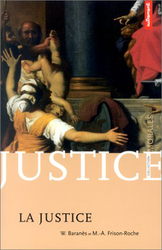
► Référence complète : M.-A. Frison-Roche, "2+1 : la procédure", in W. Baranès et M.-A. Frison-Roche (dir.), La justice. L'obligation impossible, éd. Autrement, coll."Morales", 1994, pp.193-207.
_____
► Lire l'article.
📕Consulter la présentation générale de l'ouvrage.
« Les étudiants de Sciences po peuvent lire l’article via le Drive de Sciences po en allant dans le dossier « MAFR – Régulation ».
Sept. 17, 1793
Thesaurus : 02. Lois
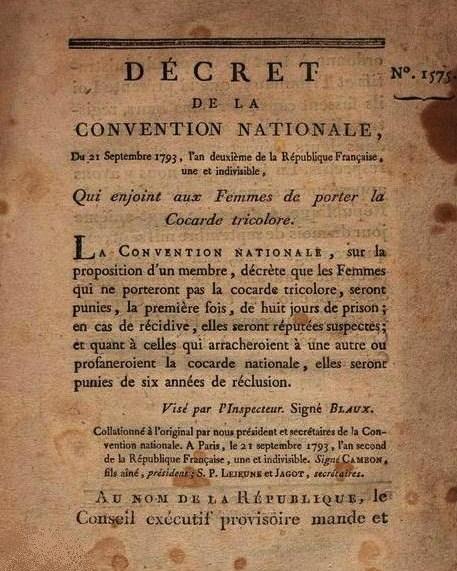
La "Loi de prairial", dite encore "Loi des suspects", plus exactement le décret du 17 septembre 1793 "relatif aux gens suspects" pris par la Convention Nationale est de sinistre mémoire.
En effet par ce texte, principalement conçu par Robespierre, organise une façon de mener les procès, sans aucune présomption d'innocence ni aucune place pour les droits de la défense.
Beaucoup de personnes furent menées à la mort par le jeu de la Loi des suspects.
A contrario, on mesure que l'Etat de droit est avant tout construit sur les principes de procédure.
On ne peut qu'être frappé entre l'analogie entre la Loi des suspects et les conseils procéduraux donnés par Staline, ordonnant pareillement d'écarter et la présomption d'innocence et tout respect du contradictoire ou des droits de la défense.